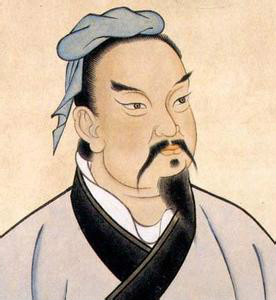Sun Tzu
Ancient Chinese military general, strategist, and philosopher
Sun Tzu
{{This 'philosopher' related article is a stub.}}
Sun Tzu (Lua error in package.lua at line 80: module 'strict' not found.
- 544 BC – 496 BC) was an ancient Chinese military general, strategist, and philosopher who is traditionally credited as the author of The Art of War, an influential work of military strategy that has affected both Western and Eastern philosophy. Sun Tzu is revered in Chinese and East Asian culture as a legendary historical and military figure.
Biography[edit | edit source]
Sun Tzu was born in the state of Qi during the Spring and Autumn period of ancient China. His birth name was Sun Wu (孫武). He later served as a general and strategist for the state of Wu, where he demonstrated his military prowess and strategic acumen.
The Art of War[edit | edit source]
The Art of War is a treatise on military strategy and tactics composed of 13 chapters, each dedicated to a different aspect of warfare. The text emphasizes the importance of adaptability, deception, and strategic planning. It has been widely studied and applied in various fields beyond the military, including business, sports, and law.
Influence[edit | edit source]
Sun Tzu's ideas have had a profound impact on both Eastern and Western military thinking, business tactics, legal strategy, and beyond. Notable figures influenced by his work include Mao Zedong, Napoleon Bonaparte, Douglas MacArthur, and Vo Nguyen Giap. His principles continue to be taught in military academies around the world.
Legacy[edit | edit source]
Sun Tzu's legacy endures through his seminal work, The Art of War, which remains a cornerstone of military strategy and has been translated into numerous languages. His teachings are still relevant in modern strategic thinking and are often cited in various disciplines.
Related Pages[edit | edit source]
- The Art of War
- Military strategy
- Spring and Autumn period
- Qi (state)
- Wu (state)
- Mao Zedong
- Napoleon Bonaparte
- Douglas MacArthur
- Vo Nguyen Giap
See Also[edit | edit source]
Search WikiMD
Ad.Tired of being Overweight? Try W8MD's physician weight loss program.
Semaglutide (Ozempic / Wegovy and Tirzepatide (Mounjaro / Zepbound) available.
Advertise on WikiMD
|
WikiMD's Wellness Encyclopedia |
| Let Food Be Thy Medicine Medicine Thy Food - Hippocrates |
Translate this page: - East Asian
中文,
日本,
한국어,
South Asian
हिन्दी,
தமிழ்,
తెలుగు,
Urdu,
ಕನ್ನಡ,
Southeast Asian
Indonesian,
Vietnamese,
Thai,
မြန်မာဘာသာ,
বাংলা
European
español,
Deutsch,
français,
Greek,
português do Brasil,
polski,
română,
русский,
Nederlands,
norsk,
svenska,
suomi,
Italian
Middle Eastern & African
عربى,
Turkish,
Persian,
Hebrew,
Afrikaans,
isiZulu,
Kiswahili,
Other
Bulgarian,
Hungarian,
Czech,
Swedish,
മലയാളം,
मराठी,
ਪੰਜਾਬੀ,
ગુજરાતી,
Portuguese,
Ukrainian
Medical Disclaimer: WikiMD is not a substitute for professional medical advice. The information on WikiMD is provided as an information resource only, may be incorrect, outdated or misleading, and is not to be used or relied on for any diagnostic or treatment purposes. Please consult your health care provider before making any healthcare decisions or for guidance about a specific medical condition. WikiMD expressly disclaims responsibility, and shall have no liability, for any damages, loss, injury, or liability whatsoever suffered as a result of your reliance on the information contained in this site. By visiting this site you agree to the foregoing terms and conditions, which may from time to time be changed or supplemented by WikiMD. If you do not agree to the foregoing terms and conditions, you should not enter or use this site. See full disclaimer.
Credits:Most images are courtesy of Wikimedia commons, and templates, categories Wikipedia, licensed under CC BY SA or similar.
Contributors: Prab R. Tumpati, MD





